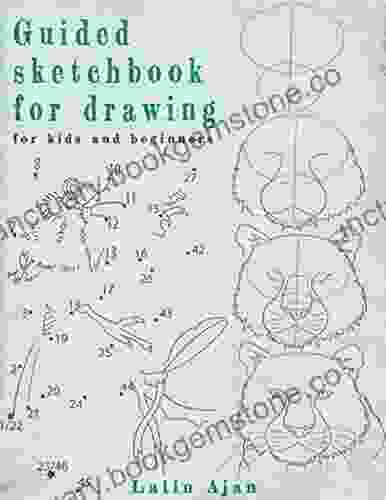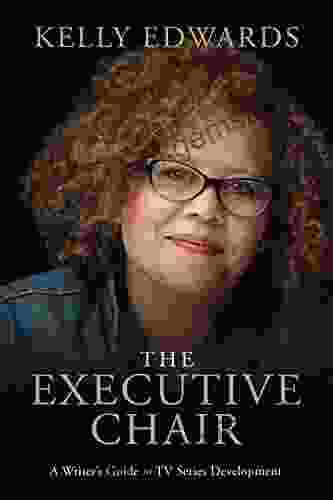The Writer's Guide to TV Development

TV development is the process of creating and developing a TV show concept into a pilot script and, ultimately, a series. It involves a team of writers, producers, and executives who work together to bring a show to life.
The Development Process
The development process typically begins with a writer or writing team coming up with an idea for a TV show. This idea is then pitched to a production company or network, who will decide whether or not to greenlight the project.
If the project is greenlit, the writer or writing team will begin to develop the show concept into a pilot script. This script will serve as a template for the series, outlining the show's main characters, storylines, and themes.
4.9 out of 5
| Language | : | English |
| File size | : | 5523 KB |
| Text-to-Speech | : | Enabled |
| Screen Reader | : | Supported |
| Enhanced typesetting | : | Enabled |
| Word Wise | : | Enabled |
| Print length | : | 152 pages |
Once the pilot script is complete, it will be submitted to the network or production company for approval. If the pilot is approved, the show will begin production.
The Role of the Writer
The writer plays a vital role in the development process. They are responsible for creating the show's concept, writing the pilot script, and overseeing the writing of the series.
How to Get Started in TV Development
If you're an aspiring TV writer, there are a few things you can do to get started in the field:
- Write a great spec script. A spec script is a sample script that you write on your own, without being commissioned by a network or production company. It's a great way to showcase your writing skills and get your foot in the door.
- Network with people in the industry. Attend industry events, join writers' groups, and connect with executives on social media.
- Get involved in development labs and workshops. These programs can provide you with valuable experience and feedback on your work.
Resources for TV Writers
There are a number of resources available to help TV writers get started in the field. Here are a few:
- The Writers Guild of America (WGA): The WGA is a union that represents writers in the film and television industry. They offer a variety of resources and services for writers, including contract negotiation, grievance filing, and educational programs.
- The Academy of Television Arts & Sciences (ATAS): The ATAS is a professional organization that recognizes excellence in television programming. They offer a variety of educational programs and resources for writers, including workshops, panels, and networking events.
- The National Association of Television Program Executives (NATPE): NATPE is a trade organization that represents television executives and professionals. They offer a variety of educational programs and resources for writers, including conferences, webinars, and networking events.
Pitching Your TV Show
Once you've developed your TV show concept and written a pilot script, you'll need to pitch it to a network or production company. A pitch is a brief presentation that outlines the show's concept, characters, and storylines.
Tips for Pitching Your TV Show
Here are a few tips for pitching your TV show:
- Know your audience. Research the network or production company you're pitching to, and tailor your pitch accordingly.
- Be concise and clear. Your pitch should be no longer than 10 minutes, and it should be easy for the listener to follow.
- Be passionate. You need to be excited about your project in order to convince someone else to invest in it.
- Be prepared to answer questions. The listener will likely have questions about your show, so be prepared to answer them thoughtfully and succinctly.
TV development is a complex and challenging process, but it can also be incredibly rewarding. If you have a passion for writing and a great story to tell, then you should consider pursuing a career in TV development.
4.9 out of 5
| Language | : | English |
| File size | : | 5523 KB |
| Text-to-Speech | : | Enabled |
| Screen Reader | : | Supported |
| Enhanced typesetting | : | Enabled |
| Word Wise | : | Enabled |
| Print length | : | 152 pages |
Do you want to contribute by writing guest posts on this blog?
Please contact us and send us a resume of previous articles that you have written.
 Best Book
Best Book Page Flip
Page Flip Bookshelf
Bookshelf Literary loom
Literary loom Chapter
Chapter Bookish
Bookish PageTurner
PageTurner Bibliophile
Bibliophile Story
Story Inkwell
Inkwell Bookworm
Bookworm Labyrinth
Labyrinth Plot Twist
Plot Twist Prose
Prose Paperback
Paperback Storyteller
Storyteller Sanctuary
Sanctuary Fiction
Fiction Reading
Reading Chronicle
Chronicle Read
Read Yan Lianke
Yan Lianke Joshua Rivkin
Joshua Rivkin Drew Kwong
Drew Kwong Laura Bradbury
Laura Bradbury Anna Todd
Anna Todd Patricia Preciado Martin
Patricia Preciado Martin Graeme Davis
Graeme Davis Rhonda Mcknight
Rhonda Mcknight Sam Fury
Sam Fury John Sugden
John Sugden Zane Lamprey
Zane Lamprey Anne Pannecke
Anne Pannecke Ann C Smith
Ann C Smith James T Deshields
James T Deshields Angus Donald
Angus Donald Andrei Besedin
Andrei Besedin Crystal Daniels
Crystal Daniels Angelina Jolie
Angelina Jolie Joseph E Persico
Joseph E Persico Angie Martinez
Angie Martinez Regine Abel
Regine Abel Andrew Graham Dixon
Andrew Graham Dixon Ann C Hall
Ann C Hall Josh Hanagarne
Josh Hanagarne Anna Goldenberg
Anna Goldenberg Andrea Erickson
Andrea Erickson Nicholas Meyer
Nicholas Meyer Bill Fawcett
Bill Fawcett Terry Brooks
Terry Brooks Heather Galler
Heather Galler Ann Aguirre
Ann Aguirre Juanitta Baldwin
Juanitta Baldwin Lynda Vaughn
Lynda Vaughn Lance Esplund
Lance Esplund Chris Weyers
Chris Weyers Charles Bukowski
Charles Bukowski Gary Spetz
Gary Spetz Wendy Jelbert
Wendy Jelbert Denny S Bryce
Denny S Bryce Anette Fischer
Anette Fischer Padma Lakshmi
Padma Lakshmi Michael Tubbs
Michael Tubbs Ryan White
Ryan White Elizabeth L Block
Elizabeth L Block Mia Sheridan
Mia Sheridan Ernest Hemingway
Ernest Hemingway Barbara Sillery
Barbara Sillery Angela Gaughan
Angela Gaughan Andrew Sutton
Andrew Sutton Erin Lewis Fitzgerald
Erin Lewis Fitzgerald Jarrett Brandon Early
Jarrett Brandon Early Eric Seale
Eric Seale Nancy Princenthal
Nancy Princenthal Margaret Wander Bonanno
Margaret Wander Bonanno Ted Kerasote
Ted Kerasote Jamila Jasper
Jamila Jasper Christina Klein
Christina Klein Bernie Marcus
Bernie Marcus Patrick Smithwick
Patrick Smithwick Nicole Grotepas
Nicole Grotepas Andrew Osmond
Andrew Osmond Danielle Prescod
Danielle Prescod Monica Moody
Monica Moody Andrew Meier
Andrew Meier Nina Willner
Nina Willner Kristina Liu
Kristina Liu Andrew Grant
Andrew Grant Marc Shapiro
Marc Shapiro Kevin Grange
Kevin Grange Tina Brown
Tina Brown Lyonel Feininger
Lyonel Feininger Barbara Lasalle
Barbara Lasalle Emily Louise Howard
Emily Louise Howard Angus Johnstone
Angus Johnstone Anna Bartlett
Anna Bartlett Anjali Enjeti
Anjali Enjeti Marina Benjamin
Marina Benjamin Gabrielle Moss
Gabrielle Moss Jane Dunnewold
Jane Dunnewold G J Younghusband
G J Younghusband Tim Slessor
Tim Slessor Bathroom Readers Institute
Bathroom Readers Institute Liz Neves
Liz Neves Jack Gernsheimer
Jack Gernsheimer Don Bluth
Don Bluth Andreas Deja
Andreas Deja L J Martin
L J Martin Ann Budd
Ann Budd Andrew Carroll
Andrew Carroll Anna Koliadych
Anna Koliadych Terry Newman
Terry Newman Sherry Ginn
Sherry Ginn Kent Wong
Kent Wong Annie Dillard
Annie Dillard Andreas Marks
Andreas Marks Anne C Heller
Anne C Heller Andy Southall
Andy Southall Stuart Campbell
Stuart Campbell Andrea Lee
Andrea Lee Anna Mocikat
Anna Mocikat Mike Epps
Mike Epps Anna Stephens
Anna Stephens Andy Keen
Andy Keen Andrew Dickos
Andrew Dickos Jake Sherman
Jake Sherman Michael Asher
Michael Asher Martin Cruz Smith
Martin Cruz Smith Harry Houdini
Harry Houdini Rita Moreno
Rita Moreno John C Cranham Dds
John C Cranham Dds Julie Ann Walker
Julie Ann Walker Kitty Gorrell
Kitty Gorrell Angela Marie Moulton
Angela Marie Moulton Carlos Del Amor
Carlos Del Amor Cion Lee
Cion Lee Doris Kennedy
Doris Kennedy Ann Marks
Ann Marks Michele Sullivan
Michele Sullivan John Charles Bennett
John Charles Bennett Ben G Frank
Ben G Frank Lakisha Johnson
Lakisha Johnson Ann Cleeves
Ann Cleeves L T Ryan
L T Ryan Katrina Mcpherson
Katrina Mcpherson Jeff Fletcher
Jeff Fletcher Stephanie Laurens
Stephanie Laurens Andy Herbach
Andy Herbach Robin Sloan
Robin Sloan Andrew M Dobell
Andrew M Dobell Alex Tannen
Alex Tannen Rob Craig
Rob Craig Ys Publishing
Ys Publishing Jill Braden
Jill Braden Anna Nadler
Anna Nadler Anne Bogart
Anne Bogart Anna Qu
Anna Qu Edward Seidensticker
Edward Seidensticker Dita Von Teese
Dita Von Teese Paul Reps
Paul Reps David Mamet
David Mamet Andy Mcdermott
Andy Mcdermott William W Johnstone
William W Johnstone Anna Deavere Smith
Anna Deavere Smith Anna Starmer
Anna Starmer Andy Mckell
Andy Mckell Stacey L Nash
Stacey L Nash Michelle Lee
Michelle Lee Laura Lee
Laura Lee Ernesto Che Guevara
Ernesto Che Guevara Lisa Dickey
Lisa Dickey Jessica Alba
Jessica Alba Dave Clayton
Dave Clayton Angelo Colorni
Angelo Colorni Ed Duncan
Ed Duncan Stephen Kurkjian
Stephen Kurkjian Andrew Bostock
Andrew Bostock Ann Blockley
Ann Blockley Caroline James
Caroline James Andrew Karevik
Andrew Karevik Fred Botting
Fred Botting Jonathan Rauch
Jonathan Rauch Shawn Kelly
Shawn Kelly Maxim Peter Griffin
Maxim Peter Griffin Darrin Duford
Darrin Duford C L Parker
C L Parker Kate Frost
Kate Frost Sylvia Day
Sylvia Day Jenny Schwartz
Jenny Schwartz Angus Roxburgh
Angus Roxburgh Frederick Stirton Weaver
Frederick Stirton Weaver Kathryn Wilder
Kathryn Wilder Charlie English
Charlie English Brian Shea
Brian Shea Jeb Rosebrook
Jeb Rosebrook Billy Ray Belcourt
Billy Ray Belcourt Anna Kirtlan
Anna Kirtlan Siren
Siren Anna Paola Sanna
Anna Paola Sanna T J Demos
T J Demos Catherine Berry
Catherine Berry Andrew Vaillencourt
Andrew Vaillencourt Royal Horticultural Society
Royal Horticultural Society Anita Brookner
Anita Brookner Mark Horrell
Mark Horrell Anna Sherman
Anna Sherman Manuel Huitzilli
Manuel Huitzilli Gary Faigin
Gary Faigin Kimberly Brock
Kimberly Brock Jane Hamilton
Jane Hamilton Val Wake
Val Wake Anita Nipane
Anita Nipane Andy Davidson
Andy Davidson Sylvan Barnet
Sylvan Barnet Van Lu
Van Lu Octave Uzanne
Octave Uzanne Sara Funduk
Sara Funduk Jeffrey Chipps Smith
Jeffrey Chipps Smith Camil Flores
Camil Flores Scott Bartlett
Scott Bartlett B Love
B Love Andrew Cunningham
Andrew Cunningham William J Lederer
William J Lederer Leslie Redhead
Leslie Redhead Dominique Auzias
Dominique Auzias Flavio Ferrari Zumbini
Flavio Ferrari Zumbini Duncan Heath
Duncan Heath Kliph Nesteroff
Kliph Nesteroff Christie Taylor
Christie Taylor Andrew Johnson
Andrew Johnson Walter Foster
Walter Foster Anjelah Johnson Reyes
Anjelah Johnson Reyes Tony Wheeler
Tony Wheeler Donald Preziosi
Donald Preziosi John M Olsen
John M Olsen Frank Kennedy
Frank Kennedy Dominic Roskrow
Dominic Roskrow Royd Tolkien
Royd Tolkien Raymond F Jones
Raymond F Jones Cissy Houston
Cissy Houston Anna Pasternak
Anna Pasternak John Driver
John Driver Jack Porter
Jack Porter Phoenix Collins
Phoenix Collins Diana Gabaldon
Diana Gabaldon Mari K Eder
Mari K Eder David Loud
David Loud Christopher Fowler
Christopher Fowler Anna Corba
Anna Corba David J Dennis Jr
David J Dennis Jr Isabel Allende
Isabel Allende Anna Jean Mayhew
Anna Jean Mayhew Sarah Herman
Sarah Herman Angela Wolf
Angela Wolf Quincy Jones
Quincy Jones Andrea Jackson
Andrea Jackson Kat Chow
Kat Chow Emiko Davies
Emiko Davies Andrew Wilson
Andrew Wilson Holly Moss
Holly Moss Frederic Lombardi
Frederic Lombardi Kindle Edition With Audio Video
Kindle Edition With Audio Video W H Bartlett
W H Bartlett Cornel West
Cornel West Bruce Feiler
Bruce Feiler Anna Badkhen
Anna Badkhen Charla Krupp
Charla Krupp Anne Billson
Anne Billson R G Richardson
R G Richardson Roman Frister
Roman Frister Henry Van Dyke
Henry Van Dyke E M Foner
E M Foner Tiffany L Warren
Tiffany L Warren Andrei Codrescu
Andrei Codrescu Andy Mcnab
Andy Mcnab James Canton
James Canton Haley Hoover
Haley Hoover Michael Punke
Michael Punke Angie Daniels
Angie Daniels George Kalmpourtzis
George Kalmpourtzis Maggie O Farrell
Maggie O Farrell Angharad Lewis
Angharad Lewis Anna Salton Eisen
Anna Salton Eisen Caroline Linscott
Caroline Linscott Danielle Geller
Danielle Geller Dina Nayeri
Dina Nayeri Andrew Mayne
Andrew Mayne Scott Thybony
Scott Thybony Magic Guidebooks
Magic Guidebooks Denys Johnson Davies
Denys Johnson Davies Tetiana Elert
Tetiana Elert Andy Warhol
Andy Warhol Andrew Juniper
Andrew Juniper Taylor Michaels
Taylor Michaels Shel Perkins
Shel Perkins Jane Akshar
Jane Akshar Nintendo
Nintendo Angela Hunt
Angela Hunt Elisa Russell
Elisa Russell Xander Black
Xander Black Judy Omar
Judy Omar David Hampshire
David Hampshire Laurinda Reddig
Laurinda Reddig Charles Reid
Charles Reid Andrea Fazzari
Andrea Fazzari Jean Ann Shirey
Jean Ann Shirey Daniella Weiss Ashkenazy
Daniella Weiss Ashkenazy Octavio Solis
Octavio Solis Dawnie Walton
Dawnie Walton Jeremy Mercer
Jeremy Mercer Annalee Newitz
Annalee Newitz Gavin Ambrose
Gavin Ambrose Farha Ghannam
Farha Ghannam Angus M Gunn
Angus M Gunn Scott Baron
Scott Baron Annabelle Honess Roe
Annabelle Honess Roe Theodore Annemann
Theodore Annemann Louise Egerton
Louise Egerton Natasha Solomons
Natasha Solomons Andrea Pflaumer
Andrea Pflaumer Carole Jackson
Carole Jackson Andrew Moriarty
Andrew Moriarty Larry Silverberg
Larry Silverberg Dorothy Hartley
Dorothy Hartley Andrew Vietze
Andrew Vietze Ronnie Smith
Ronnie Smith Ani Trime
Ani Trime Christine Leteux
Christine Leteux Hilary Spurling
Hilary Spurling Andrew Delaplaine
Andrew Delaplaine Christopher Greyson
Christopher Greyson Andrew Marble
Andrew Marble Annabel Chase
Annabel Chase Shannon Leone Fowler
Shannon Leone Fowler Andrew Tunstall
Andrew Tunstall Marie Force
Marie Force Robert Ludlum
Robert Ludlum Disamis Arcia Munoz
Disamis Arcia Munoz Michael Howard
Michael Howard Milton Glaser
Milton Glaser Betty Arnett
Betty Arnett Julie Klassen
Julie Klassen Kindle Edition
Kindle Edition Hamish Bowles
Hamish Bowles Simon Schama
Simon Schama Jack Lucas
Jack Lucas John Patrick Bray
John Patrick Bray Elaine Welteroth
Elaine Welteroth Angelico Chavez
Angelico Chavez Godfrey Baldacchino
Godfrey Baldacchino Edward Bellamy
Edward Bellamy Andrew Moor
Andrew Moor Jocelyn Harewood
Jocelyn Harewood E B Sledge
E B Sledge Shirley Anstis
Shirley Anstis David Blatner
David Blatner Tom Sileo
Tom Sileo Josie Iselin
Josie Iselin Robin Koontz
Robin Koontz Angelique V Nixon
Angelique V Nixon J N Chaney
J N Chaney John F Mullins
John F Mullins Guy Stern
Guy Stern Fern Michaels
Fern Michaels Andrew Mcmahon
Andrew Mcmahon Emily Bingham
Emily Bingham Liao Yiwu
Liao Yiwu David Nees
David Nees Andrew Darby
Andrew Darby Angie Cruz
Angie Cruz Andrew Hund
Andrew Hund C Y Croc
C Y Croc Angela D French
Angela D French Jason Kramar
Jason Kramar Jason Sommer
Jason Sommer Andrew Porwancher
Andrew Porwancher Ann Beaglehole
Ann Beaglehole Andrew Haslam
Andrew Haslam D C Palter
D C Palter Marilyn Chase
Marilyn Chase Ray Scippa
Ray Scippa Anna Malaika Tubbs
Anna Malaika Tubbs Legacy Russell
Legacy Russell Kien Nguyen
Kien Nguyen Clemantine Wamariya
Clemantine Wamariya Emma Newman
Emma Newman Robert Alan Brookey
Robert Alan Brookey John Gilstrap
John Gilstrap Lonneke Geerlings
Lonneke Geerlings Kent Babb
Kent Babb Andrew Bowden
Andrew Bowden Howard Thurston
Howard Thurston Harriet Welty Rochefort
Harriet Welty Rochefort Ruskin Bond
Ruskin Bond Diane Esguerra
Diane Esguerra Zachary Lamothe
Zachary Lamothe Yossi Maimon
Yossi Maimon Erwin Panofsky
Erwin Panofsky Nicholas Roerich
Nicholas Roerich Angie Grace
Angie Grace J B Rosenberg
J B Rosenberg J C Cooper
J C Cooper Anjan Chatterjee
Anjan Chatterjee Angel Williams
Angel Williams D C Robinson
D C Robinson Rachel Rubin Wolf
Rachel Rubin Wolf Waldemar Bogoras
Waldemar Bogoras Shellise Berry
Shellise Berry Condoleezza Rice
Condoleezza Rice Rickie Lee Jones
Rickie Lee Jones Paul Robert Walker
Paul Robert Walker Ann Hoffman
Ann Hoffman J D Robb
J D Robb Mary Robinette Kowal
Mary Robinette Kowal Bridget Alsdorf
Bridget Alsdorf Sarah Ferguson
Sarah Ferguson Susan Ross
Susan Ross Mark Henwick
Mark Henwick Melissa Riddell
Melissa Riddell Fred Saberhagen
Fred Saberhagen Erika Warmbrunn
Erika Warmbrunn Anna M Mazur
Anna M Mazur Andrew Forkner
Andrew Forkner Michiyo
Michiyo Anna Cavallo
Anna Cavallo James Martin
James Martin Steven Bleicher
Steven Bleicher Kristina Kozak
Kristina Kozak Luis Carlos Montalvan
Luis Carlos Montalvan Christopher S Wood
Christopher S Wood Andrew Parker
Andrew Parker J Bright
J Bright Andrew Dewar
Andrew Dewar Glenn Adamson
Glenn Adamson Sergio Bizzio
Sergio Bizzio Anita Heiss
Anita Heiss Kianna Alexander
Kianna Alexander Pao Lor
Pao Lor Fawzia Koofi
Fawzia Koofi Anika Fajardo
Anika Fajardo Andrea Pomerantz Lustig
Andrea Pomerantz Lustig Anna Hackett
Anna Hackett
Light bulbAdvertise smarter! Our strategic ad space ensures maximum exposure. Reserve your spot today!

 Ernest HemingwayThe Relentless Moon: A Captivating Space Epic that Explores the Extraordinary...
Ernest HemingwayThe Relentless Moon: A Captivating Space Epic that Explores the Extraordinary... Jake PowellFollow ·12.9k
Jake PowellFollow ·12.9k Carlos DrummondFollow ·13.6k
Carlos DrummondFollow ·13.6k Houston PowellFollow ·6.8k
Houston PowellFollow ·6.8k Gil TurnerFollow ·13.8k
Gil TurnerFollow ·13.8k David PetersonFollow ·4k
David PetersonFollow ·4k Harold PowellFollow ·16.8k
Harold PowellFollow ·16.8k Ryan FosterFollow ·13.1k
Ryan FosterFollow ·13.1k Henry JamesFollow ·17.8k
Henry JamesFollow ·17.8k

 Ethan Mitchell
Ethan MitchellWe Are Here To Hurt Each Other: A Deep Dive into the...
Yes, I can help you with that. Here is an...

 Xavier Bell
Xavier BellHannah Arendt: A Life in Dark Times
Hannah Arendt was a...

 Donovan Carter
Donovan CarterThe Art of Looking: A Comprehensive Exploration of Visual...
: The Power of...

 Terence Nelson
Terence NelsonUnveiling the Secrets of Moscow's Red Square: A Journey...
In the heart of Moscow,...

 Cruz Simmons
Cruz SimmonsDrawing Workbook for Kids and Beginners: An Enchanting...
: Unveiling the Magic of Drawing Drawing, an...
4.9 out of 5
| Language | : | English |
| File size | : | 5523 KB |
| Text-to-Speech | : | Enabled |
| Screen Reader | : | Supported |
| Enhanced typesetting | : | Enabled |
| Word Wise | : | Enabled |
| Print length | : | 152 pages |












